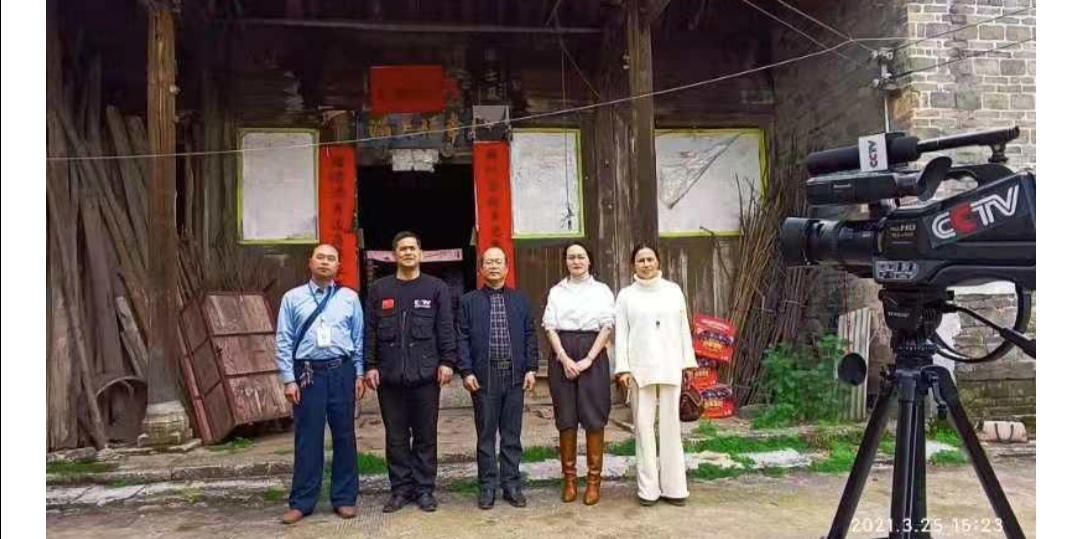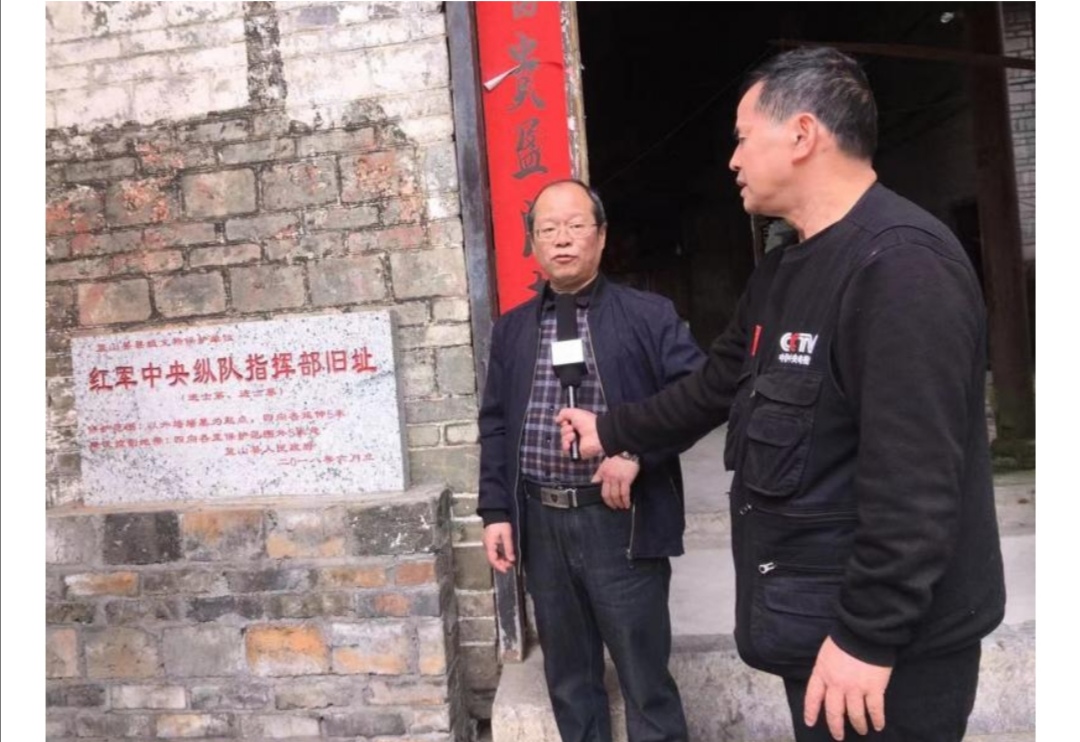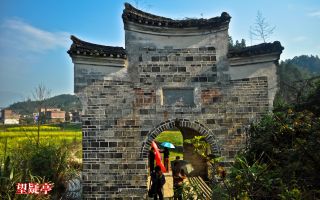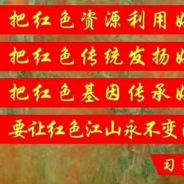世艺联红色文化协会常务副主席秦志明 走进篮山红色景区
湖南蓝山界头村红军中央纵队指挥部旧址
Former site of Red Army central column headquarters in Jietou village, Lanshan, Hunan Province

——中央红军第一个少数民族政策文件颁布的地方一、界头村基本情况。
——The first policy document of the Central Red Army on ethnic minorities was issued, which is about the basic situation of Jietou village.
塔峰镇界头村位于塔峰镇北部,下辖界新、接溪、杨伯九、站心岭、界头铺、交岭园6个自然村,16个村民小组,面积4.7平方千米,人口1909人。原位于宁远、蓝山两县交界之地,故名界头。
Jietou village of tafeng town is located in the north of tafeng town. It has six natural villages, including Jiexin, JieXi, yangbojiu, zhanxinling, jietoupu and jiaolingyuan, with 16 villager groups, covering an area of 4.7 square kilometers and a population of 1909. Originally located at the junction of Ningyuan and Lanshan counties, it was named Jietou.
明朝旅行家徐霞客在《楚游日记》中记述:“又南五里,宿于界头铺,是为宁远、蓝山之界。其西之大山曰满云山,当是紫金原之背,其支东北行,界遂因之。”同时界头也是分水岭:南部属春陵江流域,为濛溪河支流;北部属泠江河流域,溪河入宁远县境,入潇水。南宋时期,萧穆林公由江西赴任衡州知府途中,决定在蓝山县正市磐石定居。
Xu Xiake, a traveler of the Ming Dynasty, wrote in his travel diary of Chu: "you are five miles south, staying at jietoupu, which is the boundary between Ningyuan and blue mountains. The big mountain in the west is called manyun mountain, which should be the back of Zijin yuan. Its branch goes to the northeast, so the boundary is due to it. " At the same time, Jietou is also a watershed: in the south, it belongs to Chunling River Basin, which is a tributary of Mengxi River; in the north, it belongs to Lingjiang River Basin, which flows into Ningyuan county and Xiaoshui. During the Southern Song Dynasty, on his way from Jiangxi to Hengzhou, Xiao Mulin decided to settle down in Panshi, Zhengshi, Lanshan county.
1350年,萧仲兴公由磐石举家迁至蓝山界头,繁衍10代人,称老萧家;至穆林公第21代,部分人迁至新萧家。萧玉春(1829-1878)居新萧家,是清代时蓝山县唯一考中进士的人。萧玉春,宗名永球,字温其,号宝田、璧卿。自幼聪颖,三岁识字,七岁应童子试,十六岁入县学,十八岁科试补廪膳员。同治元年(1862)恩科举人,四年后举进士。
In 1350, Xiao Zhongxing moved from Panshi's family to Jietou of Lanshan, where he had 10 generations of people, known as the old Xiao family. In the 21st generation of Mulin, some people moved to the new Xiao family. Xiao Yuchun (1829-1878), who lived in Xinxiao's family, was the only one who got the Jinshi examination in Lanshan County in Qing Dynasty. Xiao Yuchun, zongmingyongqiu, Wenqi, Baotian, Biqing. He was intelligent at the age of three, took a boy's test at the age of seven, entered the county school at the age of sixteen, and made up for the dieters at the age of eighteen. In the first year of tongzhi (1862), Enke was a Juren, and four years later he was a Jinshi.
历任江西安义、万年、永新、湖口、新昌等县知县,并三次充任乡试考试官。曾修订同治六年版《蓝山县志》,写成《蓝山县志笔记》一书。他曾根据医书总结一套“诊候妊娠法”,可验证孕妇胎儿发育情况。一生著述主颇多,主要有《醉经录》《古本大学解》《碌碌山房随笔》上下卷、《公余代博录》等。1878年卒,享年五十岁。为官清廉,死后家境萧条,由亲朋资助归葬蓝山。
He has successively served as county magistrate of Anyi, Wannian, Yongxin, Hukou, Xinchang and other counties in Jiangxi Province, and served as examiners of rural examination for three times. He revised "Lanshan county annals" published in the sixth year of Tongzhi and wrote "notes of Lanshan county annals". He once summarized a set of "diagnostic pregnancy method" according to medical books, which can verify the fetal development of pregnant women. There are many works in his life, such as Zui Jing Lu, Gu Ben Da Xue Jie, Lu Lu Shan Fang essays, Gong Yu Dai Bo Lu and so on. He died in 1878 at the age of 50. He was honest and clean, and his family was depressed after his death. He was buried in Lanshan with the help of relatives and friends.
其故居现存,另有藏书楼一座,名杞梓山书楼,存书颇多。现已毁,1951年其后人将残余两千多册图书赠送县图书馆。过去界头村村舍隐避,地理位置好,虽宁蓝官道就在界头铺西侧一里多路的地方经过,但因中间有苦株山、后面岗的丛林遮掩,从路上看不见有村舍。
There is another library in its former residence, named Qizishan library, which has a large number of books. It has been destroyed. In 1951, more than 2000 volumes of the remaining books were presented to the county library. In the past, Jietou village had a good location for hiding. Although ninglan Official Road passed more than a mile to the west of jietoupu, there were no cottages on the road because of the kuzhu mountain in the middle and the forest behind the hill.

1934年11月19日,红军中央纵队长征过境,就选择界头村作宿营地,共三天两晚,并在此村开会一整天。据村民回忆,今保存的古民居建筑十余栋,都曾住过红军。二、红军长征,中央纵队住宿界头村情况1934年11月19日,红军中央纵队长征从塔峰镇雷家岭村到达界头村,并在此宿营。总政治部设在了萧玉春住宅,并于11月20日在此开会一整天;红军最高军事指挥“三人团”住宅设在南侧萧秉衡住宅,并在屋后挖了三个临时防空洞,以避敌机轰炸。
On November 19, 1934, when the central column of the Red Army crossed the border during the Long March, Jietou village was chosen as the camp for three days and two nights, and a meeting was held in this village for a whole day. According to the villagers' recollection, there are more than ten ancient residential buildings preserved today, all of which once lived in the Red Army. 2、 On November 19, 1934, the central column of the red army arrived at Jietou village from leijialing village of tafeng town and camped there. The General Political Department was set up in Xiao Yuchun's house and held a meeting here on November 20 for a whole day; the residence of the "three men regiment", the highest military commander of the Red Army, was set up in Xiao Bingheng's house on the south side, and three temporary air raid shelters were dug behind the house to avoid enemy bombing.
红军其他首长分散居住在村中各民居。中央苏维埃银行设在萧越宏住宅,在村旁一座道观中开设铸币厂铸币,旁边一栋民宅被用于开设枪械修造厂,主要修理战斗中破损的武器。11月21日上午,红军中央纵队陆续离开界头铺。关于红军在界头村宿营的三天两晚,村中不少老人都有深刻的记忆:据说当时村中守卫森严,岗哨密布。
Other leaders of the Red Army lived in scattered houses in the village. The Central Soviet bank was set up in Xiao Yuehong's residence, where a mint was set up in a Taoist temple beside the village, and a civilian house nearby was used to set up a gun repair factory, mainly to repair weapons damaged in the battle. On the morning of November 21, the central column of the Red Army left jietoupu one after another. As for the three days and two nights when the Red Army camped in Jietou village, many old people in the village have deep memories: it is said that at that time, the village was heavily guarded and heavily guarded.
周边山上到处都有放马的警卫人员,方圆一公里内的山头上都布满岗哨和机枪阵地。道观内铸币厂整夜炉火通红,听说是在铸币。界头村老支部书记萧红勋听老一辈人回忆,有一个十六七岁的小红军,被人抬进界头村杨伯九自然村一座茅屋里。因为患病,一路上都在痛苦地呻吟。因无药医治,不久就去世了。
The surrounding mountains are full of guards, and the mountain tops within a kilometer are full of sentries and machine gun positions. It's said that it's coinage. Xiao Hongxun, the Secretary of the old branch of Jietou village, heard the memories of the older generation that a 16-year-old Red Army was carried into a hut in yangbojiu natural village of Jietou village. Because of illness, I groaned in pain all the way. He died soon because there was no cure.
应红军要求,一位叫杨新元的村民与另一位也姓杨的村民临时用木板钉成一副简易棺材,抬到后山安葬。村妇联主任蒋九金告诉我们,她听自家老婆婆说过,红军和国民党军有很大的区别。
At the request of the Red Army, a villager named Yang Xinyuan and another villager surnamed Yang were temporarily nailed into a simple coffin and carried to the back mountain for burial. Jiang Jiujin, director of the village women's Federation, told us that she had heard her mother-in-law say that there was a big difference between the Red Army and the Kuomintang army.
国民党军一进村,就要求村民搞吃的。村民说没得菜,这些兵就到处找,最后找到一只村民准备用来过年的老阉鸡公,强迫村民杀了给他们吃。这村民很愤怒却不敢说半句,于是在炒菜时,故意放了很多辣椒,辣得他们一个个气喘吁吁,喝水不停。
As soon as the Kuomintang troops entered the village, they asked the villagers to get food. The villagers said they didn't have any vegetables, so the soldiers searched everywhere. At last, they found an old castrated cock that the villagers were going to use for the new year, and forced the villagers to kill him and feed him. The villager was very angry, but he didn't dare to say a word, so he deliberately put a lot of peppers in the cooking, which made them pant and drink water.
而红军来的时候,是好言好语地向村民讨要能吃的东西,边借用一勺盐都要给钱。村民不敢接钱,于是红军在走的时候把钱从门缝中塞进去。还有个妇女听说要过兵,就逃走了,等红军离开后才回来。她在自己菜地摘菜时,发现自己的菜曾被红军采摘过,不少菜芯中上放着“银毫子”。
When the Red Army came, it was kind to ask the villagers for something to eat, and they had to pay for borrowing a spoonful of salt. The villagers did not dare to take the money, so the Red Army shoved the money through the crack of the door when they left. Another woman heard that she wanted to be a soldier, so she ran away and didn't come back until the Red Army left. When she picked vegetables in her own vegetable field, she found that her vegetables had been picked by the Red Army, and there were "Silver Filigree" on many of the vegetable cores.
村民回忆,当时红军生活极为艰苦。因没法煮食,他们将从百姓那里买来的萝卜切成小块,用手捏软,擦点盐就吃。据萧任川回忆,当年红军住宿和活动情况如下:进士第:红军中央首长会议遗址进士第作坊:红军谷米加工地进士第围墙旧址:红军标语墙贡生厅:中央红军指挥部(三人团驻地)岭脚山洞:红军首长防空洞1,2,3新萧家旧宗祠:红军住宿地址萧满元旧堂屋:红军银行铸币地址老萧家:红军中央银行驻地遗址。
The villagers recalled that life in the Red Army was extremely hard at that time. Because they couldn't cook, they cut the radish they bought from the common people into small pieces, kneaded it with their hands, rubbed some salt and ate it. According to Xiao Renchuan's recollection, the accommodation and activities of the Red Army in those years were as follows: Jinshi workshop: Jinshi workshop at the site of the meeting of the central leaders of the Red Army; Jinshi wall at the rice processing site of the Red Army; Gongsheng hall at the slogan wall of the Red Army; Lingjiao cave at the headquarters of the Central Red Army (the residence of the three member regiment); air raid shelter 1, 2, 3 of the Red Army leaders; old ancestral hall of the new Xiao family; accommodation address of the Red Army: Xiao Manyuan old hall of the Red Army Address of bank coin: the site of the Central Bank of the Red Army.





张腾元